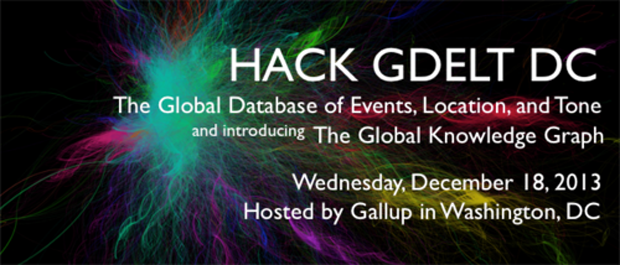
GDELT DC HACKATHON – HOSTED BY GALLUP
Wednesday, December 18, 2013
Washington, DC – The Gallup Building
Following the tremendously successful second annual GDELT Hackathon held at Penn State University this past September, we are excited to announce the GDELT DC Hackathon, hosted by Gallup, to be held in the beautiful ornate conference room of the Gallup Building (901 F St NW) in Washington, DC on Wednesday, December 18, 2013. This all-day event will open with a welcome from Jim Clifton, Chairman and CEO of Gallup and feature a morning session introducing GDELT and how it is being used today, followed by an afternoon “hackathon” where the technical and non-technical alike can come together and explore how GDELT can be used to measure, model, visualize, and even forecast global human society in powerful new ways.
The Global Database Global Database of Events, Language, and Tone (GDELT) is an initiative to construct a catalog of human societal-scale behavior and beliefs across all countries of the world over the last quarter-century down to the city level globally, to make all of this data freely available for open research, and to provide daily updates to create the first “realtime social sciences earth observatory.” Nearly a quarter-billion georeferenced events capture global behavior in more than 300 categories covering 1979 to present with daily updates. The GDELT Global Knowledge Graph (GKG) expands GDELT’s ability to quantify global human society beyond cataloging physical occurrences towards actually representing all of the latent dimensions, geography, and network structure of the global news. It attempts to connect every person, organization, location, count, theme, news source, and event appearing in the global news into a single massive network that captures what’s happening around the world, what its context is and who’s involved, and how the world is feeling about it, every single day.
| 8:30AM | 9:00AM | Registration |
| 9:00AM | 9:05AM | Introduction & Logistics |
| 9:05AM | 9:20AM | Welcome Remarks – Jim Clifton, Chairman and CEO of Gallup |
| 9:20AM | 10:15AM | Global Society through the Eyes of Big Data & GDELT – Kalev Leetaru |
| 10:15AM | 11:00AM | Codifying the World Through Event Mining – Philip Schrodt |
| 11:00AM | 11:15AM | The GDELT Global Knowledge Graph – Kalev Leetaru |
| 11:15AM | 11:30AM | Break |
| 11:30AM | Noon | Fast Talks (series of 5 min talks by GDELT users) |
| Noon | 4PM | Technical Session (Hackathon) – team up with fellow programmers to code creative new applications of GDELT in a 4-hour marathon session |
| 4PM | 5PM | Presentations / Wrapup |
REGISTRATION/FURTHER INFORMATION
This event is free, but we ask that you please register on our Eventbrite page (https://www.eventbrite.com/e/gdelt-dc-hackathon-tickets-9479851491) so we know how many people to expect. If you are planning on attending the afternoon Technical Session (the “Hackathon”), please also register on our Hacker League webpage (https://www.hackerleague.org/hackathons/gdelt-dc-hackathon) so that we know how many people to expect at that session.
This event is being held in the conference room of the Gallup Building at 901 F St NW (See on Google Maps at: http://goo.gl/maps/88Crp ). The entrance is on 9th street halfway between F and G streets right across the street from the National Portrait Gallery. It is halfway between the Metro Center and Gallery Place Metro stations and easily accessible from a number of other Metro stations.
WHO SHOULD ATTEND
While officially a “hackathon” this event should be of great relevance to both technical and non-technical alike. The morning session is entirely non-technical and is designed to introduce GDELT, its latest developments such as the Global Knowledge Graph, and to present a cross-section of how people are starting to use it. The afternoon session is the actual “hackathon” portion of the day and will largely be of interest to those with statistics and/or programming backgrounds to get together in a collaborative environment, share ideas, and work together to prototype great things. Even if you’ve never written a line of programming code and advanced statistics is not your area of expertise, the morning session should be of great interest in surveying today’s reality of “big data” and how GDELT can be used to measure, model, visualize, and even forecast global human society in powerful new ways.